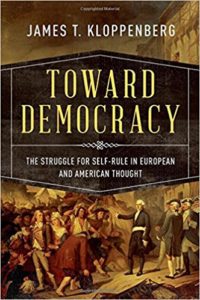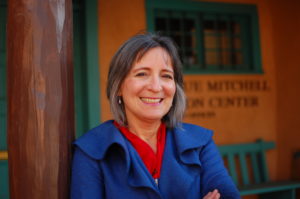By Lilian Calles Barger https://lilianbarger.com
James T. Kloppenberg, Toward Democracy: The Struggle for Self-Rule in European and American Thought (Oxford University Press, 2016), 892 pages of text plus endnotes. Extended notes available here http://scholar.harvard.edu/files/jameskloppenberg/files/toward_democracy_extended_notes.pdf
It’s my pleasure to introduce this roundtable on James T. Kloppenberg’s masterful work Toward Democracy: The Struggle for Self-Rule in European and American Thought. I encountered the book shortly after its publication last year and had the opportunity to host a podcast conversation with the author.
Kloppenberg, who needs little introduction for readers of this blog, is the Charles Warren Professor of American History at Harvard University. He is well known for his previous books including Uncertain Victory: Social Democracy and Progressivism in European and American Thought, 1870-1920 (Oxford University Press, 1986); The Virtues of Liberalism (Oxford University Press, 1998); Reading Obama: Dreams, Hope, and the American Political Tradition (Princeton University Press, 2011). He has been the recipient of multiple awards including an elected fellow of the American Academy of Arts and Sciences, a Guggenheim Fellowship and the Merle Curti Award from the OAH.
Toward Democracy with its depth and breadth is a big book, one requiring a sustained energy for a topic—a rare lifetime achievement. Reading it over a period of six weeks and my conversation with Kloppenberg convinced me that a S-USIH roundtable was called for. As an intellectual history, he provides a long and deep analysis of the ideas that are at the  heart of the democratic process sure to fuel debate beyond the field. In an epic narrative, he traces the workings of democracy beginning with ancient Athens and Rome to the New England town meeting through revolutionary America and Europe to the threat presented by of the American Civil War. He identifies key concepts and the conflict fraught process of applying the principles of deliberation, pluralism, and reciprocity in establishing a form of government fostering the realization of popular sovereignty, autonomy and equality. The ugly side of the story of democracy, with its ever-extending horizon, is the propensity for violence by both radical and reactionary factions—a sobering thought for us today. Drawing from the works of classic, religious and Enlightenment political thinkers and placing ideas within the context of social upheaval, Kloppenberg gives us a close encounter with a beleaguered democratic ideal.
heart of the democratic process sure to fuel debate beyond the field. In an epic narrative, he traces the workings of democracy beginning with ancient Athens and Rome to the New England town meeting through revolutionary America and Europe to the threat presented by of the American Civil War. He identifies key concepts and the conflict fraught process of applying the principles of deliberation, pluralism, and reciprocity in establishing a form of government fostering the realization of popular sovereignty, autonomy and equality. The ugly side of the story of democracy, with its ever-extending horizon, is the propensity for violence by both radical and reactionary factions—a sobering thought for us today. Drawing from the works of classic, religious and Enlightenment political thinkers and placing ideas within the context of social upheaval, Kloppenberg gives us a close encounter with a beleaguered democratic ideal.
Both heroes and villains populate Kloppenberg’s historical drama, making the book a reading adventure. Accessible but not trite, profound but not burdensome, and, as one non-academic and yet an intellectual curious friend of big books said, “this should be read by every student before high school graduation.” And so it should. In a time when many see a crisis for democracy reflected in the election of Donald Trump or the threatened breakup of the European Union, some are asking if voters, ordinary people, can be trusted. Kloppenberg answers by taking us back to origins, principles, ideals, and the necessary moral grounding and what is at stake in giving up on democracy.
S-USIH blogger Tim Lacy, who led an online reading of the book, sees Kloppenberg’s narrative as fundamentally shaped by the idea of democracy as an “ethical project.” In that endeavor, the pursuit of democracy takes the “form of self-government that advances the common interest” rather than securing self-interest. Lacy notes Kloppenberg’s attention to the moral sources for democracy in religion, to justice as a priority for the common good in the writings of James Madison, and to pluralism in the midst of demands for unity during the French Revolution. For Lacy, Toward Democracy, felt like “a tremendous, semester-long course of instruction in American political history.” That course augments Lacy’s own post-Civil War training, allowing him as a student of “great books” to connect in a deeper way with political thinkers that are often encountered “acontexually” or in abridged forms. Impressed by the close reading of works by significant thinkers from John Winthrop to Jean-Jacques Rousseau, Lacy found their “ghosts” animating the thought of Abraham Lincoln. At a time of great national peril, Lincoln’s humility, and his “slow, deliberate navigation through the uncharted waters” of a nation in crisis, served as a fitting ending to Kloppenberg’s book. Lacy sees the book on the shelves of intellectual historians for years to come and concludes “Kloppenberg has crafted an ambitious, integrative story that is now the definitive statement on the idea of democracy in the trans-Atlantic world through the American Civil War.”
It is too early for the full complement of professional reviews or to determine the multi-faceted significance of Toward Democracy. Early commentary includes the historian Tom Cutterham who writing for the New Republic sees Kloppenberg as a possible and needed “prophet of democracy.” Cast as a “Jeremiah” he sees him as proclaiming a story of “waywardness rather than redemption.” John T. McGreevy, also a historian and writing for the progressive Catholic journal Commonweal, sees the book as displaying “erudition… a product of a lifetime of reading at the intersection of history and political theory” marked by John Dewey’s belief in “uncertainty, provisionality, and the continuous testing of hypotheses.”
In my own reading, the book offered a progressive narrative infused with a critical introspective mood. With the feel of a constructive project, I struggled with what the practice of democracy in colonial American with its town meeting realistically offers us today. The democratic project of New England has gone through a complete reworking to be hardly recognizable. Our multicultural society, where both geographic and social distance produces a lack of meaningful social ties and infinitely separate citizens and their representatives from each other, is a long way from the local face-to-face negotiation of a male householder in religious and ethnically homogeneous New England. Kloppenberg raises other questions. Having passed through the filter of liberalism, has the meaning of democracy expanded, as we tend to believe, fallen from its highest aspirations, or shown to be highly adaptable to the exigencies of history? It will take time to find any possible consensus and conclude whether Toward Democracy is a story of progress or declension or whether it offers instead a profoundly pragmatic proposal whose truth can only be validated by history itself.
To help us think critically about Kloppenberg’s work, we have gathered three scholars to begin the process of sifting out the arguments in Towards Democracy: Holly Brewer is Burke chair of American cultural and intellectual history at the University of Maryland; Claire Rydell Arcenas is an assistant professor at the University of Montana; and Daniel Wickberg an Associate Professor of Historical Studies and the History of Ideas at the University of Texas at Dallas. With their breath and depth of knowledge, they provide us with keen insights into this important book. I believe you will find their comments thoughtful and provocative. To wrap up the roundtable, Kloppenberg will offer his response. Along the way, we encourage your comments, questions, and reflections. I hope you find something useful for your own work in the thoughts that follow.
Lilian Calles Barger (www.lilianbarger.com) is an independent scholar and an intellectual,  cultural and gender historian and a frequent podcast host on the New Books Network. Her forthcoming book tentatively entitled The World Come of Age: Religion, Intellectuals and the Challenge of Human Liberation will be published by Oxford University Press in 2018. She is currently researching the history of the gender revolution.
cultural and gender historian and a frequent podcast host on the New Books Network. Her forthcoming book tentatively entitled The World Come of Age: Religion, Intellectuals and the Challenge of Human Liberation will be published by Oxford University Press in 2018. She is currently researching the history of the gender revolution.

5 Thoughts on this Post
S-USIH Comment Policy
We ask that those who participate in the discussions generated in the Comments section do so with the same decorum as they would in any other academic setting or context. Since the USIH bloggers write under our real names, we would prefer that our commenters also identify themselves by their real name. As our primary goal is to stimulate and engage in fruitful and productive discussion, ad hominem attacks (personal or professional), unnecessary insults, and/or mean-spiritedness have no place in the USIH Blog’s Comments section. Therefore, we reserve the right to remove any comments that contain any of the above and/or are not intended to further the discussion of the topic of the post. We welcome suggestions for corrections to any of our posts. As the official blog of the Society of US Intellectual History, we hope to foster a diverse community of scholars and readers who engage with one another in discussions of US intellectual history, broadly understood.
Thanks for mentioning my review in TNR! It’s free to read online, so for the benefit of your readers, here’s the link: https://newrepublic.com/article/138263/back-founding
Thanks for posting it here!
Glancing at T. Cutterham’s review, I see he quotes K. as calling the French Revolution (not just the Terror, but apparently the whole Revolution) a “tragedy.” That doesn’t sound like “a progressive narrative” to me (but I haven’t read the book).
Kloppenberg expresses a deeply critical mood through out that sees the move toward democracy (tentative progress) as plagued by multiple reversals including the French Revolution and subsequent events. Those sections dealing with France, I found to be the most interesting because it’s not a straight move forward and influenced how Americans saw democracy working or not working. Democracy is messy.
It would be interesting to know, among other things, how his argument re the Fr. Rev. has been received in France, where the ideals of the Republic are routinely invoked by many politicians at various points on the spectrum. The book has been out long enough that there are probably some French reviews by now, but I don’t really have time to hunt them up at the moment.